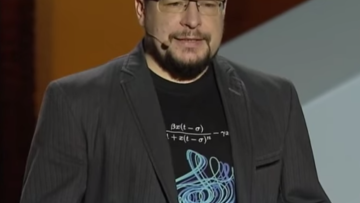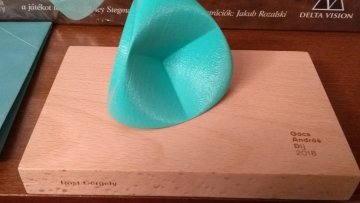A new mathematical award has been established in Hungary to honour the memory of talented Hungarian mathematician András Gács (1969-2009), a man famed for his popularity among students and his capacity to inspire the young. The committee of the András Gács Award aimed to reward young mathematicians (under the age of 46), who not only excelled in research, but also motivated students to pursue mathematics.
Cascade-Recovery Dynamics on Complex Networks
Abstract
Cascading phenomena are prevalent in natural and social-technical complex networks. We study the persistent cascade-recovery dynamics on random networks which are robust against small trigger but may collapse for larger one. It is observed that depending on the relative intensity of triggering and recovery, the network belongs one of the two dynamical phases: collapsing or active phase. We devise an analytical framework which characterizes not only the critical behaviour but also the temporal evolution of network activity in both phases. Results from agent-based simulations show good agreement with theoretical calculations. This work is an important attempt in understanding networked systems gradually evolving into a state of critical transition, with many potential applications.
15:45
Frobenius splittings of toric varieties
Abstract
Varieties admitting Frobenius splittings exhibit very nice properties.
For example, many nice properties of toric varieties can be deduced from
the fact that they are Frobenius split. Varieties admitting a diagonal
splitting exhibit even nicer properties. In this talk I will give an
overview over the consequences of the existence of such splittings and
then discuss criteria for toric varieties to be diagonally split.
Treating vertex transitive graphs like groups
Abstract
In 2012 Eskin, Fisher and Whyte proved there was a locally finite vertex transitive graph which was not quasi-isometric to any connected locally finite Cayley Graph. This motivates the study of vertex transitive graphs from a geometric group theory point of view. We will discus how concepts and problems from group theory generalise to this setting. Constructing one framework in which problems can be framed so that techniques from group theory can be applied. This is work in progress with Agelos Georgakopoulos.
14:15
Decomposition spaces: theory and applications
Abstract
Decomposition (aka unital 2-Segal) spaces are simplicial ∞-groupoids with a certain exactness property: they take pushouts of active (end-point preserving) along inert (distance preserving) maps in the simplicial category Δ to pullbacks. They encode the information needed for an 'objective' generalisation of the notion of incidence (co)algebra of a poset, and motivating examples include the decomposition spaces for (derived) Hall algebras, the Connes-Kreimer algebra of trees and Schmitt's algebra of graphs. In this talk I will survey recent activity in this area, including some work in progress on a categorification of (Hopf) bialgebroids.
This is joint work with Imma Gálvez and Joachim Kock.
On spectra of Diophantine approximation exponents
Abstract
Exponents of Diophantine approximation are defined to study specific sets of real numbers for which Dirichlet's pigeonhole principle can be improved. Khintchine stated a transference principle between the two exponents in the cases of simultaneous approximation and approximation by linear forms. This shows that exponents of Diophantine approximation are related, and these relations can be studied via so called spectra. In this talk, we provide an optimal bound for the ratio between ordinary and uniform exponents of Diophantine approximation for both simultaneous approximation and approximation by linear forms. This is joint work with Nikolay Moshchevitin.
Weakly-normal basis vector fields in RKHS with an application to shape Newton methods
Abstract
We construct a space of vector fields that are normal to differentiable curves in the plane. Its basis functions are defined via saddle point variational problems in reproducing kernel Hilbert spaces (RKHSs). First, we study the properties of these basis vector fields and show how to approximate them. Then, we employ this basis to discretise shape Newton methods and investigate the impact of this discretisation on convergence rates.
Randomized algorithms for computing full, rank-revealing factorizations
Abstract
Over the past decade, the randomized singular value decomposition (RSVD)
algorithm has proven to be an efficient, reliable alternative to classical
algorithms for computing low-rank approximations in a number of applications.
However, in cases where no information is available on the singular value
decay of the data matrix or the data matrix is known to be close to full-rank,
the RSVD is ineffective. In recent years, there has been great interest in
randomized algorithms for computing full factorizations that excel in this
regime. In this talk, we will give a brief overview of some key ideas in
randomized numerical linear algebra and introduce a new randomized algorithm for
computing a full, rank-revealing URV factorization.
Discontinuous Galerkin method for the Oseen problem with mixed boundary conditions: a priori and aposteriori error analyses
Abstract
We introduce and analyze a discontinuous Galerkin method for the Oseen equations in two dimension spaces. The boundary conditions are mixed and they are assumed to be of three different types:
the vorticity and the normal component of the velocity are given on a first part of the boundary, the pressure and the tangential component of the velocity are given on a second part of the boundary and the Dirichlet condition is given on the remainder part . We establish a priori error estimates in the energy norm for the velocity and in the L2 norm for the pressure. An a posteriori error estimate is also carried out yielding optimal convergence rate. The analysis is based on rewriting the method in a non-consistent manner using lifting operators in the spirit of Arnold, Brezzi, Cockburn and Marini.



